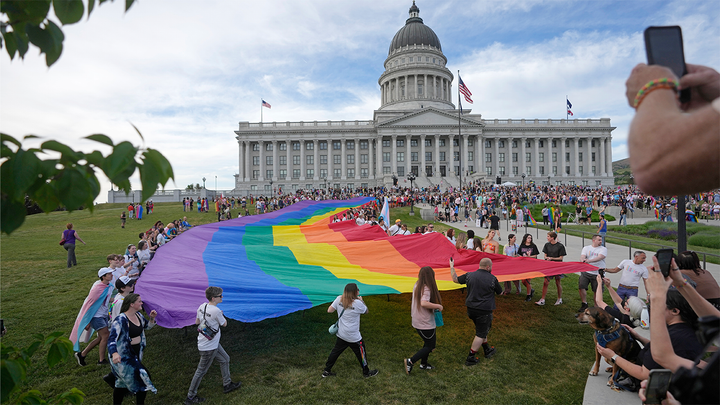Utah has become the first state to ban LGBTQ+ Pride flags from being displayed in government buildings and public schools, a move that also prohibits other political flags, including those bearing former President Donald Trump’s slogan, “Make America Great Again.” The controversial law, which has drawn both praise and criticism, aims to enforce political neutrality in public institutions but has also sparked concerns about limiting LGBTQ+ representation.
Republican Governor Spencer Cox announced that he would allow the ban to become law without his signature. While he expressed serious reservations about the policy, he acknowledged that the Republican-dominated legislature would likely override any veto attempt. By allowing the bill to pass without his direct approval, Cox sought to strike a balance between his concerns and the political realities of Utah’s legislature.
The law, set to take effect on May 7, imposes a $500 daily fine on state or local government buildings that display any flag not explicitly approved by lawmakers. Only the American flag, the Utah state flag, military flags, and a limited selection of others will be permitted. Flags supporting political candidates or movements—including MAGA flags—will be strictly prohibited, signaling an effort to prevent government spaces from becoming arenas for political messaging.
However, the new law could create friction between the state government and Salt Lake City, Utah’s largest and most progressive city. Historically, city officials have honored Pride Month in June by prominently displaying LGBTQ+ flags at government buildings. In response to the legislation, Salt Lake City and Salt Lake County officials have illuminated their government buildings with rainbow lights as an act of protest. The city’s mayor, Erin Mendenhall, has indicated that legal teams are currently reviewing the law, leaving open the question of how the city will respond when enforcement begins.
The bill’s sponsors, Republican Rep. Trevor Lee and Sen. Dan McCay, argue that the legislation is designed to promote “political neutrality” within schools and government offices. They contend that public employees, including teachers, should not use their workplaces to promote political ideologies. However, opponents argue that the law disproportionately targets LGBTQ+ representation under the guise of neutrality. Many critics see it as an attempt to suppress LGBTQ+ visibility, particularly in areas where local governments lean more liberal than the state’s Republican leadership.
In a letter to legislative leaders explaining his decision, Governor Cox expressed support for the bill’s goal of maintaining political neutrality in classrooms but also voiced concerns that it unnecessarily restricted local governments. Notably, the law focuses solely on flags, meaning that other political displays—such as posters or illuminated buildings—are not explicitly banned. This loophole could allow cities like Salt Lake City to continue finding creative ways to express support for marginalized communities.
Governor Cox also addressed Utah’s LGBTQ+ community directly, acknowledging the difficult impact of recent legislation. “Politics can be a bit of a blood sport at times, and I know we’ve had our disagreements,” Cox stated. “I want you to know that I love and appreciate you, and I am grateful that you are part of our state.” While his words sought to offer reassurance, many within the LGBTQ+ community remain skeptical, viewing the law as yet another attempt to marginalize their voices in public spaces.
As the law’s implementation date approaches, legal challenges and local government responses could shape its long-term impact. The debate over political expression in public institutions is far from over, and Utah’s decision may set a precedent for other conservative-led states considering similar measures.
